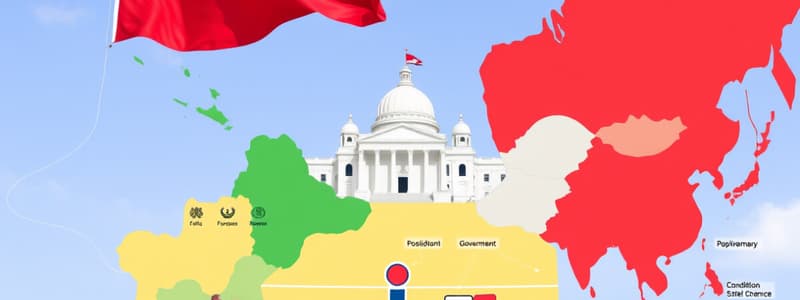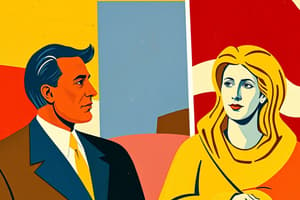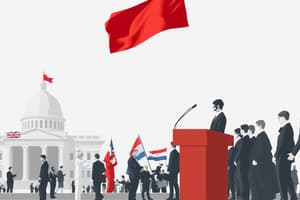Podcast
Questions and Answers
What is Democracy?
What is Democracy?
- A government without laws
- A government ruled by a single leader
- When the citizens hold the political power (correct)
- A form of government with representatives
What is Representative Democracy?
What is Representative Democracy?
Citizens elect leaders to represent their rights and interests in government.
What is Direct Democracy?
What is Direct Democracy?
Citizens are directly involved in the day-to-day work of governing the country.
What is Oligarchy?
What is Oligarchy?
What is Theocracy?
What is Theocracy?
What is Autocracy?
What is Autocracy?
What is Monarchy?
What is Monarchy?
What is Constitutional Monarchy?
What is Constitutional Monarchy?
What is Dictatorship?
What is Dictatorship?
What is Junta?
What is Junta?
What is Anarchy?
What is Anarchy?
Flashcards are hidden until you start studying
Study Notes
Political Systems
- Democracy: Citizens possess political power, enabling them to participate in governance directly or indirectly.
- Representative Democracy: Citizens elect representatives who advocate for their rights and interests within the government framework.
- Direct Democracy: No representatives are involved; citizens engage directly in governance, making decisions collectively.
Types of Governments
- Oligarchy: Power resides with a small group, often excluding broader political rights based on party membership, social class, or ethnicity.
- Theocracy: This government recognizes a divine being as the ultimate authority, integrating religious leadership with political power.
- Autocracy: One individual exercises absolute power and authority over the government and its citizens.
- Monarchy: A royal figure, such as a king or queen, commands the state, maintaining ultimate control over governmental decisions.
- Constitutional Monarchy: The monarch shares power with elected representatives and must operate within the confines of the nation's constitution.
Authoritarian Rule
- Dictatorship: Characterized by a single leader who maintains comprehensive control over all aspects of life, including constitutional governance if it exists.
- Junta: A military-led group that seizes control of a nation, ruling through force and often suspending constitutional governance.
- Anarchy: A state of absence of government and authority, represented symbolically by an "A" enclosed in a circle, indicating the lack of control over societal order.
Studying That Suits You
Use AI to generate personalized quizzes and flashcards to suit your learning preferences.




